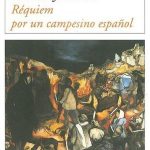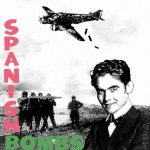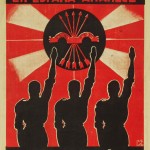If Francisco Ayala’s La cabeza del cordero skirts the question of causes–and indeed, perhaps, of causality itself–preferring to see the civil war as an absurd irruption of violence that comes almost from nowhere, Ramón Sender’s Réquiem for un campesino español is, by contrast, all about origins. So much so, indeed, that his book, too, ends up stopping short of addressing the war directly.
First week lecture
The slide’s from yesterday’s lecture can now be found here.
Hola
¡Hola a todos!
¡Hola a todos! Mi nombre es Annie. Estoy de White Rock. Soy en mi quarto ano a UBC. Estoy en la Facultadad de artes. Me gusta escuchar música y tocar música. Toco el violín, piano, y un poco de la flauta y el saxofón. Me gusta escuchar las baladas, música clásica y la música pop. Algunos de mis pasatiempos son ver películas, plegado origami y la natación.
saludos
Me alegra poder participar en este curso. Me llamo Danyi Cheng, mis amigos me llaman Dani o Paz. Soy de China. Ahora estudio la maestría de Estudios Hispánicos en UBC. Espero pasar un buen verano con vosotros y con los libros. Nos vemos pronto!
Semana Uno: Introducciones
¡Hola a todos!
Me llamo Raya y estoy en el último semestre del programa de maestría en los estudios hispánicos en la Universidad de Columbia Británica. Recibí mi B.A. en español, también de UBC, en junio de 2014.
Nací en Canadá, pero crecí en los Estados Unidos. Me mudé a Vancouver en 2010 para empezar mi bachillerato, entonces hace casi seis años que vivo acá.
Mis intereses de investigación incluyen el siglo de oro, el boom latinoamericano, la obra de la Generación del 27. Ahora mismo estoy a mediados de escribir mi tesina de la maestría que trata del Quijote, específicamente la aventura caballeresca del protagonista que va concentrando en la búsqueda y el deseo de Dulcinea del Toboso.
Participé en dos conferencias este año como miembro de los comités organizadores (“Regional Identities on a Global Scale: Translation, Audiences, Reception,” Italian Studies Conference, April 2016; y “Translation, Adaptation, Transformation,” Sixth Biennial Graduate Student Conference, October 2015). Fueron unas experiencias muy buenas y aprendí un montón sobre la organización, el tiempo, y el esfuerzo requeridos para dar una conferencia.
Me interesó este curso en primer lugar porque hasta ahora no he estudiado la Guerra Civil con mucha profundidad, y porque será mi primer curso con Jon, uno de los únicos profesores del departamento FHIS del cual nunca he tomado clase.
Estoy emocionada conocerles y empezar este viaje con ustedes.
Ciao.
Hello world!
Introduction: SPAN 530
I am a Masters student in Hispanic studies and am looking forward to the intense experience of this course. Reading so many books in such a short time will be a challenge, but I’m sure it will be a rewarding one.
I came to UBC after living about two years in Colombia where I worked as an English teacher and a translator. Before that, I did my BA in Romance Languages at the University of Alberta. Though I spent most of my childhood in a small town in southern Alberta, I have lived most of my adult life in Edmonton.
In this course I am particularly interested in seeing the different ways that the Spanish Civil War is represented, especially as it is a conflict in which international, national, and regional concerns or forces seem to intersect. Although this may be difficult in this course, I am also interested in seeing how the works on this conflict are similar to or different from those talking about other internal conflicts in Latin America.
I look forward to meeting you all tomorrow and to seeing where this course takes us!
The New Yorker on the International Brigades

New York University students in the Abe Lincoln Brigade pose during the Spanish Civil War, April 15, 1938. (AP Photo)
In this week’s New Yorker, Caleb Crain has a pretty good article on the International Brigades that both includes a fairly decent summary of the Spanish Civil War as a whole, and also mentions Orwell and Hemingway at some length: “Lost Illusions: The Americans who fought in the Spanish Civil War” (The New Yorker, April 18, 2016).
Welcome to SPAN430/530!
Welcome to SPAN430/530, “Novelas de la guerra civil española.” I’m very much looking forward to the class, and we’re reading some great books (including two Nobel prize-winners!).
Like every summer course, this will be a fairly intense experience. We will spend a lot of time together in a short time. I thought therefore it would be good to introduce the course ahead of time so you might be able to prepare a bit before we start.
I have put up a provisional syllabus. A couple of the novels are fairly long–the Hemingway in particular, but it’s a great book (some say, his best). If you were going to read ahead, then you might want to start on this, or perhaps on the Cela. On the other hand, there are some texts that are quite short: the Sender and Méndez, for instance.
You may want to find other ways to get hold of some of the books: the UBC bookstore is not always your cheapest option.
I have also put up further details and description, including information about your assignments. Note that one feature of the assignments is that (if you are an undergraduate student, i.e. in SPAN430 rather than SPAN530) you will be able to opt out of reading one of the books if you wish. So the reading load is not as onerous as it may seem at first glance. I certainly do not want this to be overwhelming.
I’d further point you to the fact that for our very first session we have a guest: Serge Alternês, who has recently published Live Souls, a book of photographs taken by his father, who was a volunteer ambulance driver during the war. I have written a brief review of this book. You don’t have to buy it, but it will be a great experience to listen to Serge present on it.
One more thing: you’ll notice that several of the books (Orwell, Hemingway, and Malraux) we are reading in English. As a result, the class discussion will also be roughly half in English (when we are dealing with these texts) and half in Spanish.
Finally, I should say that it would be ideal if we had a couple more students in the course, so if you have any friends looking for some summer credits, do encourage them to sign up. It should be fun. If they have any questions, they can get in touch with me.
Looking forward to meeting you all in a few weeks!



